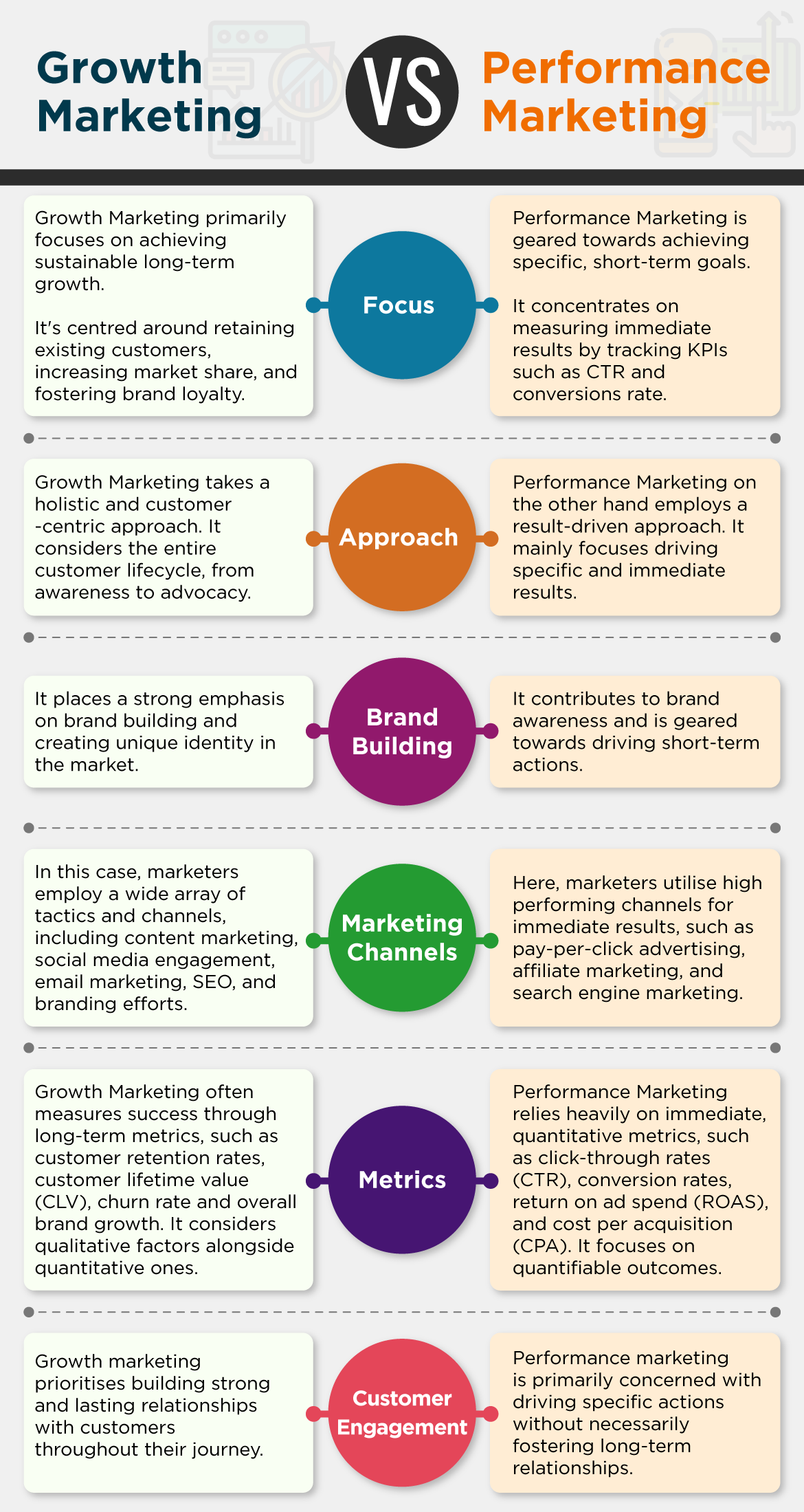In today’s world where digital is the new normal, it is imperative for businesses to establish a solid online presence. This means they need effective marketing strategies to drive leads and elevate business performance. However, choosing the right approach can be confusing. The common dilemma faced by companies is the choice between Growth Marketing and Performance Marketing.
If you are also wondering –
What is Growth Marketing or Performance Marketing?
Do they mean the same, or do they have distinct characteristics?
Should your business use both, or one can suffice?
Then, we are here to help you out. In this blog, we provide you with a complete understanding of both these strategies, highlighting their key features and differences.
Let’s begin by taking a closer look at growth marketing.
2. Key Features of Growth Marketing
According to Nielsen meta-analysis of CPG campaigns, full-funnel marketing strategies receive up to 45% higher ROI compared to single-funnel campaigns.
This statistic underscores the efficacy of growth marketing which focuses on the entire customer lifecycle journey beginning with acquiring leads, extending to retaining and nurturing them into loyal customers and advocates.
Now, let’s take a closer look at its key features –
2.1 Full-Funnel Marketing
Unlike the traditional marketing approach that ends with lead generation, growth marketing focuses on the entire customer journey, from awareness to conversion and retention. As a result, it helps businesses to captivate potential customers early on, nurture them to become leads, and finally convert them into customers and later loyal advocates.
2.2 Agile and Flexible Framework
The agile and flexible framework of growth marketing enables marketers to adapt quickly to changing market conditions, consumer behaviours, and emerging trends. Due to its highly adaptive nature, it allows for rapid adjustments based on real-time data and performance metrics. This ultimately helps businesses pivot their strategies instantaneously and allocate resources effectively.
2.3 Multi-Channel Approach
Growth marketing recognises that consumers have diverse online preferences. Hence, it embraces multi-channel approach and allows advertisers to communicate with their audiences across various digital channels. This includes social media, paid media advertising and more. But at the same time, growth marketers ensure that the brand’s voice, values, and identity remain uniform across all channels.
2.4 Data-Driven Decision Making
In the case of growth marketing, marketers rely heavily on collecting and analysing data to gain insights into target audience behaviours, preferences and the performance of marketing initiatives. This helps them make informed decisions, refine their strategies and optimise campaigns, ensuring a more impactful and efficient marketing approach.
2.5 Experimentation and Testing
Marketers regularly conduct A/B tests, split tests, and multivariate experiments to refine their strategies. These experiments help identify the most effective messaging, channels, and tactics that resonates best with the target audience. This iterative approach allows for constant improvement, enabling businesses to adapt quickly to changing market conditions.
Now that we have explored the key attributes of growth marketing, let’s shift our focus towards examining the core features of performance marketing.
3. Key Features of Performance Marketing
According to Hostinger Tutorials, “Almost 50% of chief marketing officers spend their budget on performance media.”
The above number suggests that businesses are increasingly spending their marketing budget on performance marketing – a result-oriented approach that ensures tangible outcome. It leverages tactics like paid advertising, affiliate marketing, and search engine marketing to optimise conversions and maximise revenue.
Let’s move forward to the critical aspects of performance marketing –
3.1 Quantifiable Outcomes
Performance marketing is characterised by its emphasis on quantifiable outcomes. It revolves around measuring and tracking specific KPIs and metrics, such as clicks, conversions, sales, and ROI. This feature allows advertisers to evaluate the success of their campaigns and determine which tactics are most effective.
3.2 Precise Audience Targeting
By leveraging data and insights, advertisers can identify and reach the most relevant audience segments through performance marketing. This data-driven process ensures that marketing efforts are finely tuned to resonate with the individuals most likely to convert, optimising campaign effectiveness and return on investment.
3.3 Pay-for-Performance Model
This is one of the defining characteristics of performance marketing. Advertisers pay marketing service providers only when specific outcomes are achieved. This model aligns marketing expenses directly with results, mitigating the risk of squandered ad spend and ensuring a more cost-effective method to advertising.
3.4 Action-Focused Approach
In performance marketing, the emphasis is on encouraging specific actions from the audience. Whether it is clicking on an ad, filling out a form or making a purchase, the marketing efforts are designed to prompt immediate responses. This action-focused approach ensures that every marketing initiative contributes directly to the desired outcomes.
3.5 Conversion Rate Optimisation
CRO involves continuously refining campaigns and landing pages to enhance the likelihood of conversions. Advertisers use A/B testing, user experience improvements, and data analysis to identify and eliminate barriers to conversion, resulting in improved marketing ROI and campaign effectiveness.
Now that we have outlined the key features of both marketing strategies, let’s conduct a comparative analysis to help you determine which one is suitable for your business.
4. Growth Marketing vs. Performance Marketing: Which One Suits Your Business Goals?
Growth and performance marketing each has their own distinct methodologies, objectives, and strengths. The decision about which tactic to adopt lies on how they align with your business goals and industry dynamics.
Let’s look deeper into these strategies and understand which marketing aligns most closely with your business objectives.

Let’s further understand the difference between growth and performance marketing with example.
For instance, a software company that specialises in project management tools chooses growth marketing strategy plan to boost awareness. This can involve producing a series of in-depth guides, webinars, and blog posts on project management best practices. Over time, this effort cultivates brand authority and builds long-term trust among their audience.
While consider an e-commerce retailer aiming to boost holiday season sales through performance marketing strategy. They launch a targeted pay-per-click (PPC) advertising campaign across search engines and social media platforms. The campaign features ad copies, compelling visuals, and specific product promotions. This helped them drive immediate website traffic and conversions.
Now that you understand the difference between growth marketing vs performance marketing, let’s see how a digital marketing firm can guide you in making an informed decision and developing the most suitable tactic to achieve your specific goals.
5. How Can a Digital Marketing Agency Help?
Partnering with a digital marketing agency can be beneficial when it comes to choosing between growth and performance marketing strategies. A digital marketing agency’s expertise lies in assessing your business, aligning objectives, and suggesting a suitable strategy that can help propel your business towards success.
Growth Ganik is a full-stack digital agency with over 15 years of marketing strategy experience. Our team of experts will first conduct an in-depth analysis of your business. We’ll then audit your existing strategies, gather insights, and tailor recommendations depending on whether you’re looking for either long-term growth or immediate, quantifiable results. Finally, we’ll implement meticulously crafted growth or performance marketing strategies to propel your business to success.
Schedule a 45-minute free consultation with our team of experts to assess and determine the optimal strategy that aligns with your business’s unique needs and objectives.















